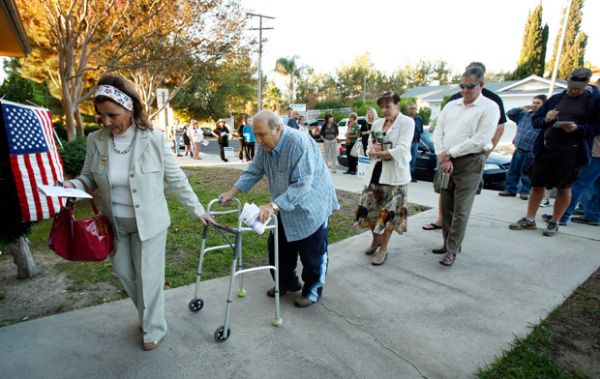Long Lines and Closed Polls Call for Online Voting Debate

It’s time to begin the discussion on how to effectively and securely host a national online election. This year America was confronted with many harsh realities about the mechanisms we have in place and the deceptively frail infrastructure we have built to ensure that our citizens are able to exercise their most-important right as Americans.
All Americans are aware of the devastation that Hurricane Sandy caused along the eastern seaboard and as far West as Ohio. The storm has affected millions of Americans and dramatically affected the way they participated in this election.
In Manhattan and Staten Island polling locations were closed and relocated to Brooklyn and Queens. New Jersey was forced to close polling locations as many were left without power.
In states across the country hundreds of voters lines up at their local polling places and waited for hours to cast their vote. Other states had early voting scandals where Americans were denied the opportunity to vote through bureaucratic and logistical nightmares.
Volunteer efforts sprung to action in New Jersey and New York to mitigate the harms caused by closed polling locations. These volunteers allowed for some of these locations to open so residents could vote. The state also allowed residents to vote by e-mail or fax. These residents requested a ballot online from the Secretary of State, had a ballot e-mailed to them, and were asked to return the ballot online. The e-mail voting system was established with such haste as to force the state to extend the voting period for three days and raise major security and counting questions.
In Florida litigation started by the Democratic Party allowed voters to participate when county officials attempted to close early polling and judges had to extend early voting.
Regardless of the cause, eligible voters were denied their constitutional right to participate because the system is fundamentally flawed. It is time to begin discussing how to remedy the problem.
States that are facing long lines or last-minute disasters and logistical headaches have many options. These states could extend mail-in voters to all eligible voters in the state, they could extend early voting, or open more polling locations.
These states could also build a secure, easy to use, auditable, and accurate online voting system that would be in place regardless of events happening offline. Long lines at polling locations could become a thing of the past. Difficulty counting ballots and ensure that the tally is completely accurate, while eliminating voter fraud is entirely possible.
Online voting systems are being used the world over. This election should be a wake up call to Americans that this is possible and is an attractive alternative to the status quo.




